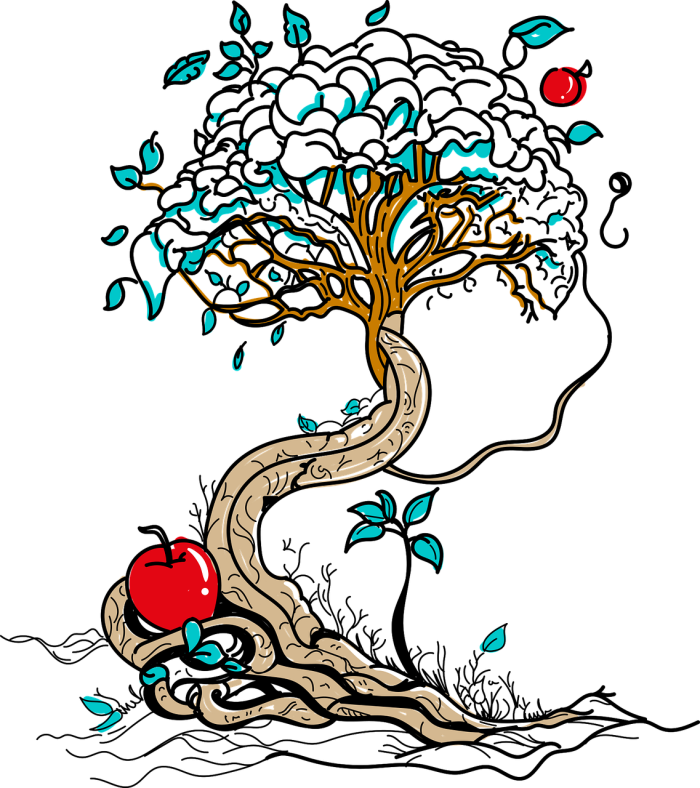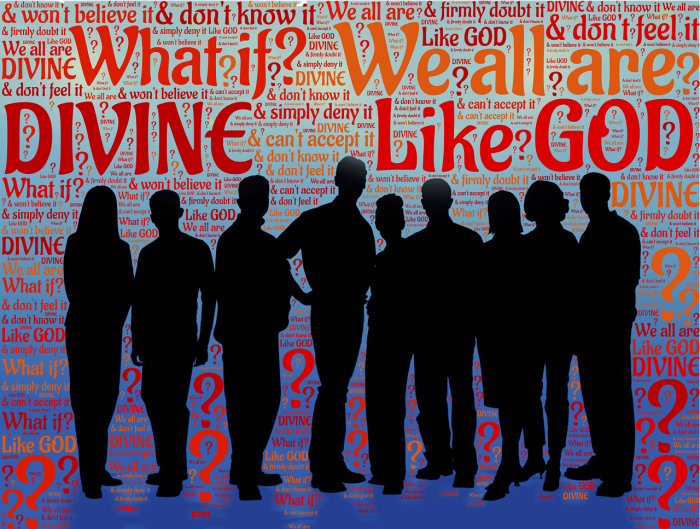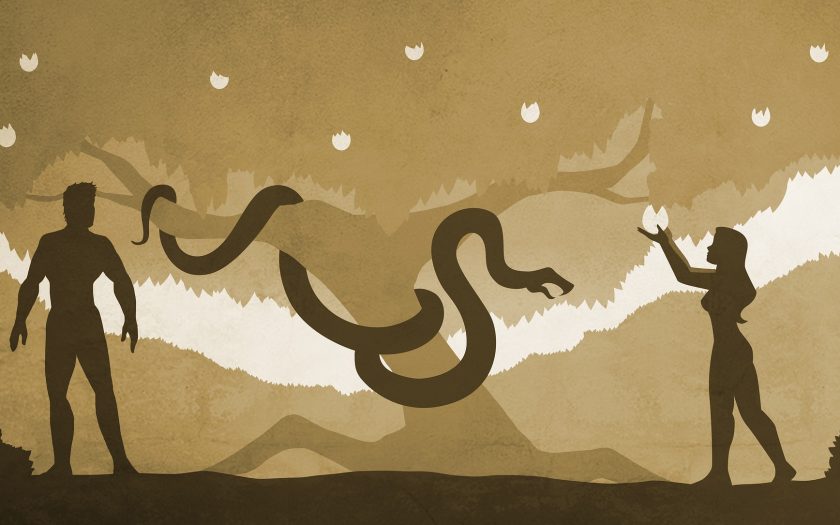Just what is that: the sin in us? From an early age I was taught that it is the source of our sins. The cause within us, through which every human being sins. But what exactly is it? Recently I ran across the fact that in Genesis 3 and 4 there are a few expressions that probably do have something to say about "the sin in us" or if you will "the old nature". For me it was a discovery of which I am happy to share something here.
Consequences of the Fall
All kinds of comments are often made about what went wrong at the Fall. Especially about what Eve didn't do right, but also about Adam, how he "let it happen.
I think these are all important points to think about further. Nevertheless, we will leave them for now and want to focus on one of the consequences of this event.
For both woman and man, the consequences of the Fall were dire. The man would spend his life toiling on a cursed earth and the woman would experience pain during pregnancy and childbirth.

But what we give little thought to is that one phrase in Genesis 3:16 "To thy husband shall thy desire go, but he shall rule over thee". What this phrase means is explained very differently. Yet I'm stubborn enough to think it's something we actually give far too little thought to, because I suspect it's at the heart of the Fall.
Cain and sin
When we read a little further in Genesis we encounter the same expression. In chapter 4:7 the Lord speaks to Cain : "(...) sin is at the door. To you his desire goes out, but you must rule over him". It is the same expression as in Chapter 3.
Cain is furious because of Abel's sacrifice, and the Lord tells him that if he continues with it, it will not go well for him. Sin is lurking, because 'the lust of sin goes out to you'. Surely this 'coveting' of sin can be nothing other than sin wanting to rule over Cain, to have control over him. That is a situation that God says Cain should not want, because He says 'you must rule over him'. So it must be just the other way around: Cain must rule over sin. He must - so to speak - rule sin and not allow sin to rule over him.
| Bible text | 'To you his desire goes out ... | ... but you must rule over him“ |
| Sin lusts after Cain ... | ... but (So here comes a contradiction) You should (rightly) rule over sin | |
| So coveting sin is actually sin "coveting" to rule over Cain. | But, just the other way around, you must rule over sin |
Back to Adam and Eve
Now that we have seen what "coveting" and "ruling" mean in the case of Cain, it also makes sense to apply it to Genesis 3:16. "To thy husband shall thy desire go, but he shall rule over thee”.
If we read this in the same way as 4:7 we get the following.
| Bible text | 'To thy husband shall thy desire go.... | ... but he will rule over you" |
| The woman desires the man ... | ... but (so here comes a contradiction) the man will (rightly) rule over you | |
| So coveting the woman is actually that she "covets" to rule over the man. | But (it will be just the other way around) he will rule over the woman |
Then this text is about the relationship between Adam and Eve, which will be characterized by an opposite will. For Eve wants to rule over Adam and Adam will not allow it and will rule over Eve. Both actions are a consequence of the Fall, for God had not made man that way.
Adam and Eve were created by God as different people - man and woman - but completely equal, and in that harmony - that unity - they could serve God together. There was no lordship over the other in that, and it was not like that from the beginning. But the Fall changed all that and that sinful desire - that coveting to be more/higher/better - is in every human being.

God saying about Adam that he will rule over Eve does not mean that from then on Adam is head of the family or anything like that. It is not a command for Adam, but a kind of judgment on Eve. She will experience that Adam too has the same sinful "lordliness" in him.
The harmony between the first man and woman was at least disrupted, if not gone, by the Fall. Satan knew that this would be the consequence, not only for them, but for their entire posterity. Sin would - so to speak - go into their DNA and be hereditary.
The essence of the Fall
This is the problem created by the Fall: the question of which of us is the boss, which of us is in control and who decides what should be done. Since the Fall, every human being gives the same answer: I am!
"The sin in us: the deep urge in each person to want to be more or better than the other."
"We keep looking for things we can 'score' more with than others."
"We want to rule over others and don't want others to rule over us."
"By nature, we want to be more, higher, better than others; in other words, to be god."
Satan already said it to Eve: if you eat from the tree, then you will be like God. He knew what it would bring about in man; then you will feel higher than others. Then you will be higher and better than anyone else.
Thus, man fallen into sin has the same motive as Satan himself, who is bent on taking the place of God. Soon Satan's man, "the son of destruction," will present himself as God in the temple and bring God's judgment upon himself (2 Thessalonians 2:3,4,8).
I think we may say that here we encounter the core of sin in us. The fact that every human being has this desire within him to be more than the other in some way, to rule over the other. It is the source of all the sinful acts of human beings and of all the problems people have with each other. Of chaos and misery, of injustice and war and you name it.
This is the constant conflict that exists between people. It explains not only the "battle between the sexes," but also between all human beings. From the beginning - of which only Cain is mentioned - to the present time; and so it will remain until the end.
The fratricide
Cain noted that while Abel's sacrifice was accepted by the Lord, his own was not. He rejected God's offer of salvation and thought he would find a way by himself. In doing so, he went down the wrong path and could be deceived by Satan.
This makes it clear that the sin in us causes us to be unable to tolerate another being higher/better/more than ourselves. Cain saw that Abel was more in God's favor and he did not tolerate that.

“Cain: he was out of anger and beat his brother to death. And why did he beat him to death? Because his works were evil and his brother's were righteous." (1 John 3:12)
Next it says that Cain ignited in great anger. This is remarkable because it means that very intense emotions overtook him that led him to kill his brother.
The latter is plainly attributable to the devil, for he is a "murderer of men from the beginning" (John 8:44). It does not take away Kain's own responsibility. But Satan is able to direct man through the path of emotions - "our feelings". That is how it began and that is how it still is.
So the first sin mentioned after the Fall of Adam and Eve is this violence of Cain and the murder of his brother. With that, it is also the prototype of the way Satan goes with people. First rejecting the salvation promised by God, then letting the lie whisper to you and following your nature, and finally it ends with sowing death and destruction.
The world of Cain is a prototype
With Cain came a world that still has the characteristics of the early days: despising God's salvation and ruling by force over your fellow men.
You can read about it in Genesis 4:16-24. People built their cities and set up their societies according to their own ideas.
Someone wrote about this: 'The family of Cain is a microcosm: the pattern of technical ability and moral failure is that of humanity.' The world still is: technically capable of great things, but morally depraved. Or as John puts it: 'the whole world lies in evil' (1 John 5:19)

Eventually, this led to fallen angels mixing with humans (Genesis 6) which corrupted the entire human race and required God to send the judgment of the Flood. Remarkably, it is also mentioned here that because of this mixing, special power and violent people were born, who are called "violent people of the ages" (Genesis 6:4). So that the whole earth became "depraved and full of violence" (6:11-13).
It is "the way of Cain" that ultimately and inevitably leads to the judgment of God (Jude 1:11,15).
Fortunately, God has always had "His people" anyway, beginning with Seth and continuing through to Noah. Noah "found grace in the eyes of the Lord ... and walked with God," so that he was spared from judgment.
The sin in us
With the Fall, the entire human race became sinners (Romans 5:9). Every person has sin in him by which he "naturally" believes that he is more, or better, or more important than the other. But that other naturally relates to him in the same way. One wants to rule over the other and the other wants to rule over the one and precisely not be dominated....
This coveting, this lordship that is in every human being is "the sin in us. It is the main thing that we inherited from our parents and is bound to our mortal body throughout our entire earthly life.
It is important to understand that Genesis 3 is not about all kinds of sins that would result from the Fall; God is not talking about that. But rather it is about the sin in us: 'I am more than the other' and that results in all kinds of sins. The extreme example that comes immediately afterwards in Genesis is Cain killing his brother, as we have already seen above.

That "sin in us" is already visible in a child, who can already say "no" of their own accord. You don't have to teach them that. And when they get a little older they can try to boss other children around even without being taught. It is ingrained in every human being from the beginning.
Sin and sins
The difference between "sin" and "sins" was taught to me from an early age. Sin (singular) then is the source of our sins, that within us which produces sinful acts. But I must honestly say that I am actually only now beginning to understand a little bit about what that sin in us concretely is. That it has to do with what I think about myself - the self - in relation to others and how easily that is reflected in behavior as well.
Now suppose we all live as reasonably pious Christians, so you certainly cannot say that our lives are characterized by sin, there is still that problem of sin within us. As a result, not only do we feel ourselves higher and better than others, but by nature we will reflect that in our behavior. Moreover, we may also give all kinds of good-sounding reasons for that, because we don't realize that it stems from the sin within us.
That sin in us is actually an elusive thing, probably because it is so deeply embedded in our humanity. It is intertwined with being human and characterizes man's doings. It is the deepest driving force of what man undertakes in life.
The Man from heaven: made sin
Let us look at our Lord Jesus Christ. It is written about Him that "He knew no sin" (2 Corinthians 5:21). It does not say that He did no sin, although of course that is entirely true as well.
But it says that He did not know sin. Sin - as the source of sin - was not in Him and therefore He did not have and know that inner urge to want to be more, higher or better than those around Him. Although, of course, He was much higher; He was God who became man, the man from heaven who humbled Himself (Philippians 2: 6-8; 1 Corinthians 15:47).
Never did He elevate Himself above anyone else; not above His disciples, but not above His enemies either. He always went the lower way, the way that led Him to the cross of Calvary. He was the only one who was truly "meek and humble in heart," and in so doing He also set Himself as an example to His disciples (Matthew 11:29).

But that perfect man - who knew no sin - had to make atonement on Calvary's cross and therefore be "made sin.
“For Him who knew no sin He made sin for us, that we might become the righteousness of God in Him." (2 Corinthians 5:21).
How terrible that is. Because it means that God saw Him as the source of our sin. He charged Him with guilt so that our sin would not be imputed to us and we would be imputed righteousness from God.
It was terrible for Him because the Lord Jesus is the holy one, the perfect one, which made this imputation the worst thing that could happen to Him. God turned His face away from Him, had to leave Him in those three hours of darkness. Even if, for example, some Psalms speak very clearly of His suffering, we cannot understand its depth.
Died with Christ
When a person comes to faith, he gratefully accepts the sacrifice Christ made. Then He died for you and was judged in your place by God. This then includes not only the forgiveness of sins, but also the judgment of sin in us. That has been judged by God in the Lord Jesus Christ.
“God sent His own Son in a form similar to sinful flesh and that because of sin, and condemned sin in the flesh". (Romans 8:3).
So our sin has already been judged by God, which means that in His dying we have also died with Him. In the sense that my sinful nature - also called the sin in me, the flesh or the old man - has been crucified and died with Christ. But if the sin in me has died with Christ in His death, then it no longer lives and therefore no longer rules over me.
For that was the problem as God had said, that sin would rule over man.
A believer does still have sin in him. So he can still sin, but sin no longer rules over him. Or in other words, the believer no longer serves sin as a slave. Sin is not lord over him (Romans 6:6-12). That is why it says:

“For sin shall not reign over you." (Romans 6:14). Thus, a believer is set free from the dominion of sin and thus is free to serve God (Romans 6:18-22).
Therefore, it may also say that we "(...) to another, namely, to Him who was raised from the dead, that we might bear fruit for God." (Romans 7:4).
It is normal for a believer to stop living for himself. That does not mean that you just give up your work and everything and become a missionary or something, but that in your life the things of Christ have become the most important thing for you. By "the things of Christ," then, we mean that the work and person of the Lord Jesus Christ are the most important thing in your life.
It says so "He died for all, that they who live may no longer live for themselves, but for Him who died and rose for them." (2 Corinthians 5:15).
Worldliness
By nature, man thinks highly of himself; that is the sin that is in us.
But God's people-both in the Old and New Testaments-are called to think humbly of themselves. In many places1 it is made clear to us that humility, submission, humbleness is an essential characteristic of the Christian life. Just look up these texts and further we have already on this website earlier written a bit about it.
But here I would like to point out another section and that is that exalting ourselves above others is called worldliness by Paul. For this we first quote a section from Romans 12.
“1I urge you then, brethren, by the mercies of God, to dedicate your bodies to God as a living sacrifice, holy and pleasing to God: that is your reasonable religion.
2 And do not be conformed to this world, but be changed by the renewal of your mind to discern what is the good, pleasing and perfect will of God.
3 For by the grace given to me, I say to every one of you not to think higher than he should think, but let him think in humility, according to the degree of faith as God has assigned to each.
4 For as in one body we have many members and the members do not all have the same function, 5 so we, though many, are one body in Christ, but each separately members of one another.
6 And now we have gifts of grace, distinguished according to the grace given to us:
7 or prophecy, according to the measure of faith; or service, in serving; or he who teaches, in teaching; 8 either who encourages, in encouraging; who distributes, in sincerity; who leads, with commitment; who cares for others, with cheerfulness." (Romans 12:1-8)
This section is the call to serve God in all our lives (verse 1). This then begins - according to verse 2 - with the most important thing, which is that our thinking should not be worldly. We have seen before in this article that this means, first of all, that we do not exalt ourselves above others. Not thinking that we are more than others, as is normal in the world. That this is really the intention here is confirmed in verse 3, where Paul says very explicitly that we should not think more of ourselves than is appropriate.
When it comes to worldliness in Christendom, it is usually about outward things or sinful practices. But that is not what we are talking about here; worldliness is that we easily and often think we are better than others. That is deeply entrenched within us. But that's a whole other story, and that then comes very close to our own inner self.
The topic is of great importance to the Christian community as the remainder of these verses show. For each has received gifts from God (see also 1 Corinthians 12:4-11) and His intention is that with them the whole as one body in Christ2 would function. But that can be severely compromised by our natural tendency to self-exaltation. It can eventually lead to the destruction of community.
To begin with, everyone should not think more highly of himself than is consistent with the degree of faith God has given him. And this is "inversely proportional," as it is called. On the contrary, if you believe that God has given you greater gifts in the church you should think more modestly of yourself. Worldliness is that if you have greater gifts, you are also better or more important. Because that is the worldly and natural way of thinking about ourselves, "I have more, therefore I am more. But that is not the Christian way of humility and humbleness; it is not following our Lord Jesus Christ to be "humble in heart". On the contrary, the Christian way of thinking about ourselves should be: 'I have more, therefore I am less'.
What we may do for the Lord, we do in the awareness that God has given and entrusted to us those things - each his or her own gift, see verse 6 - by grace. We need that grace to keep us from pride.
Lest I should exalt myself
Paul had received from God a tremendously great service; he had to pass on truths that God had not revealed before. In that context, Paul writes in 2 Corinthians 12 about a very special supernatural experience he went through. He mentions that he was carried away to paradise and there heard words that a human being was not allowed to utter. Beyond that, he doesn't say much about it because he doesn't want his fellow believers to put him, Paul, on a pedestal for that reason. He expresses it this way: "lest anyone think more of me than what he sees of me or hears of me." (2 Corinthians12:6).
Yet that apparently was not enough, for he might make himself look forward to it. "He might exalt himself" - it's noted twice in verse 7 - and to prevent that, God gave him an angel of Satan to beat him with fists. All sorts of conjectures have been made about what this might be, but I see no reason not to take it literally. Therefore, I assume that Paul was being harassed with some regularity by a demon of Satan who was making his life so difficult that he prayed to the Lord three times that this might cease. But the Lord's answer was that His grace would be enough for him.
Imagine: these were transcendent revelations on the one hand. But opposite were deep and dark experiences that somehow led him not to elevate himself above others.
Thus, the Lord used these things to teach this great servant Paul to be humble and not to exalt himself above others. It taught him to "stand aside in submission" in many matters (Galatians 2:5). On this, see also here and here.
If the Lord had not done this in this way and given him grace again and again, Paul would have become haughty, which would have harmed his ministry and the Gospel. That certainly would have happened, because that is what man is by nature.
Still personally
What about ourselves? These are things that are very recognizable and very close. We never really talk about them, but if we are honest, these things are also in our hearts.
And the annoying thing is that we cannot remove this from our hearts; it is indissolubly part of our old nature, the "sin in us.
Once I heard the story of an old brother who had spoken from the Word of God in a meeting. After the service, a sister approached him and told him that he had spoken beautifully. Our brother's response was quite direct: "Yes, the devil told me that too!
Perhaps he should have expressed himself a little differently, but at least the meaning was clear. At least that old brother knew of the danger of elevating yourself.

To learn humility, there is nothing better for us than to engage with our Lord and Savior, Jesus Christ. How He humbled Himself incredibly deeply for our sake.
"Take My yoke upon you, and learn from Me that I am meek and humble of heart; and you will find rest for your souls; for My yoke is gentle and My burden is light." (Matthew 11:29-30)
The mind [=thinking] of Christ: "Who, while He was in the form of God, did not consider it a robbery to be like God, but stripped Himself by assuming the form of a slave and becoming like men. And being found in the form of a man, He Humiliated himself and became obedient, unto death, yea, unto the death of the cross." (Philippians 2:6-8)
That disposition should also be in us: "Do nothing out of self-interest or self-importance, but let in humility one considers the other more excellent than themselves." (Philippians 2:3)
O make us to Your glory
meek, humble, good.
Teach us to bear your yoke Lord
With peace in our minds,
O Lord, let Your Person
fulfill heart and mind,
That Your peace may dwell in us,
Then we are fearless.
Lord, let Your glorious image
to us in this way,
That our hearts are undivided
beating only for You yet.
Song 197 Spiritual Songs (2016)
Footnotes

